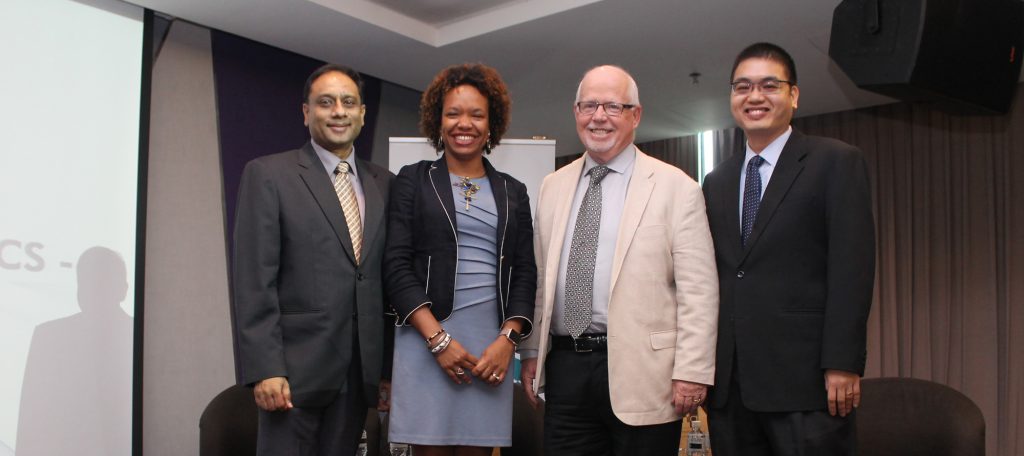
What do professional accountants in Malaysia need to know about the changes to the Ethics Code?
By Nazatul Izma
In April 2018, the International Ethics Standards Board for Accountants (IESBA) released a completely rewritten Code of Ethics for Professional Accountants that is easier to navigate, use and enforce.
At the recent MIA Ethics Seminar on Code of Ethics – A Key to Public Trust, Gary Hannaford, Chair of IESBA’s Safeguards Task Force and Diane Jules, Deputy Director of IESBA shared some insights into what professional accountants need to know about the revamped Code.
A Simplified Code
The revised Code is much clearer about how accountants should deal with ethics and independence issues. ‘The most important message that we want to convey is that the Ethics Board has gone through a very comprehensive process of looking at the Code of Ethics that pertains to close to three million professional accountants around the world,’ said Gary.
‘We have tried to make the Code clearer, more easily understandable and more helpful to the professional accountants to navigate and understand how they should be applying it,’ he continued.
This will also facilitate global adoption and enforcement. ‘That’s important in order to continue to reinforce the trust that the public has in the services provided by professional accountants,’ added Diane.
More Description, Guidance and an Enhanced Glossary
For clarity, the rewritten and restructured Code is far more descriptive. ‘We absolutely focused our attention on trying to making sure that the key terms were well defined and well described. The glossary has been enhanced to make sure that when professional accountants try to follow the Code, they really do understand what all the terms means, the requirements of the Code and how to apply the Code,’ emphasised Gary.
IESBA was careful to ensure that the restructured Code remains principles-based, although major revisions have been made to the unifying conceptual framework—the approach used by all professional accountants to identify, evaluate and address threats to compliance with the fundamental principles and, where applicable, independence.
‘The fundamental principles remain the same but the conceptual framework was revised to help professional accountants understand what they need to do when there are threats to those fundamental principles and the work that they do.’
The revised Code includes far more guidance and examples. ‘When there are identified threats that might not be at an acceptable level, we try to give guidance as to what type of actions they might take to reduce that threat to an acceptable level, or to eliminate it altogether. And if we find situations where it is just not possible to identify a way to address the threat, we make it clear that professional accountants understand that they must walk away,’ explained Gary.
‘That (guidance) is much more explicit than ever in several sections of the Code. For example, where auditors are providing non-assurance services, we’ve pointed out examples of situations where there might be far more risks than rewards,’ continued Diane.
Professional Judgement
The revised Code also calls for professional accountants to exercise stronger professional judgement in determining whether a fundamental principle had been violated.
Gary pointed out that the language used to introduce the safeguards in the Code was intentionally changed. ‘The Code doesn’t just state examples of safeguards anymore, but also states examples of actions that might be a threat. This was deliberately done and intended to trigger professional accountants to think about the specific circumstances and the facts that they’re dealing with and apply judgement to determine whether this (action) is in fact a safeguard.’
Ravi Navaratnam, Chairman of the MIA Ethics Standards Board said that the extensive revamp of the Code and the widening of the situational examples was of great advantage to the profession.
‘We want to encourage professional accountants to think about what they’re doing,’ said Gary. However, Ravi noted that this was of particular relevance in countries, including Malaysia, within the Malaysian context where professional accountants have either become so used to either ‘rote actions or thinking that if something is not in the Code then it doesn’t exist.’
Safeguard Independence
Gary and Diane emphasised the importance of adhering to independence standards. Following questions and answers from the floor during the panel session moderated by Ravi, Diane observed that within the Malaysian context, SMPs are advising SMEs on how to report financial statements. ‘That is a no-no and there is a clear prohibition for doing that (preparation of financial reporting) which is a senior management responsibility – that is a no-no,’ she clarified. ‘You have to be independent. Auditors can’t sign off on the audit on accounts that you helped to prepare,’ continued Gary.
The ethics seminar also featured a short session by Tan Khoon Yeow, a member of the MIA Ethics Standards Board who spoke on the key challenges of complying with ethical requirements in Malaysia, specifically NOCLAR (non-compliance with laws and regulations) and long association conundrums.
Renamed the International Code of Ethics for Professional Accountants (including International Independence Standards), the new Code becomes effective in June 2019. Stakeholders can access the new Code on the IESBA’s website, where implementation resources and other supporting materials were released throughout the period leading up to the effective date.







